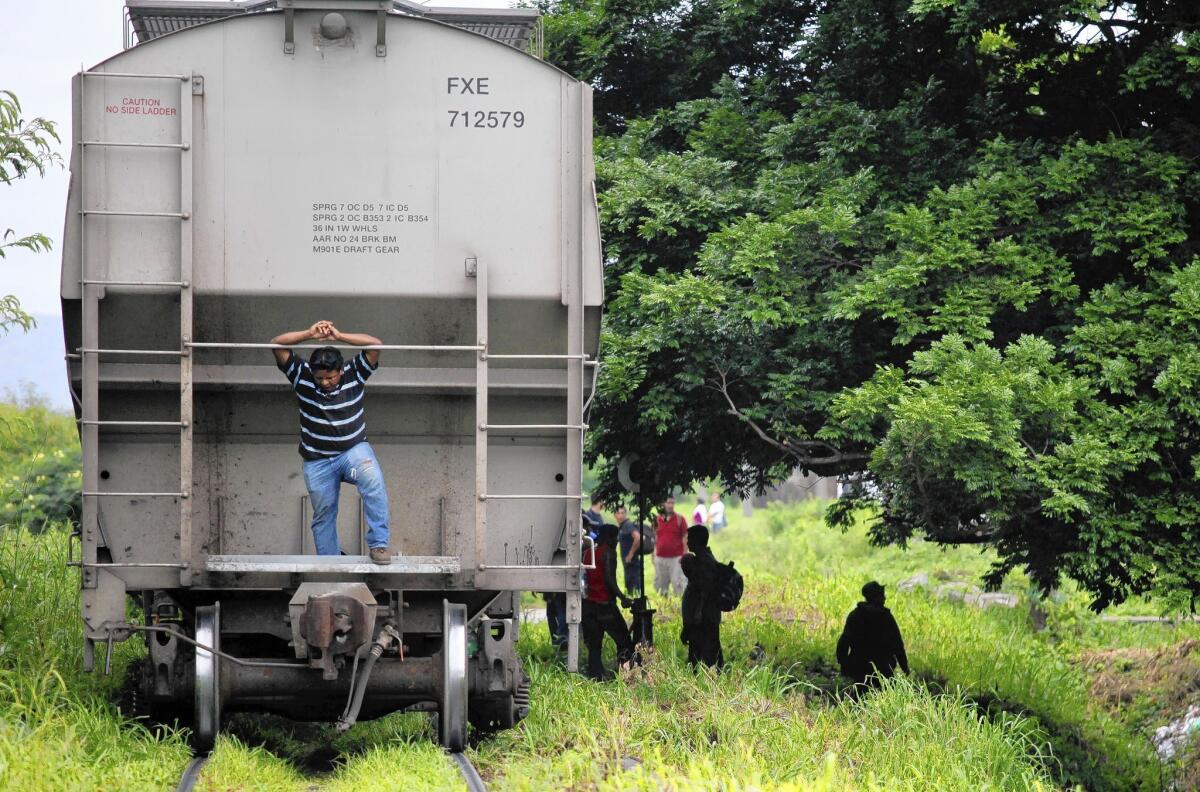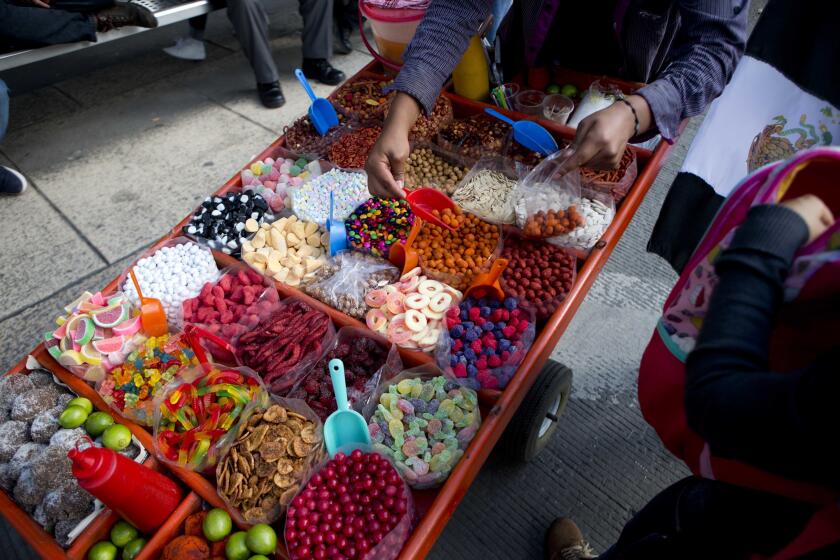Mexico crackdown keeps migrants off trains known as ‘La Bestia’

Reporting from San Ramon, Mexico — Around midnight, armed with flashlights, Mexican immigration agents halted “La Bestia” — the Beast.
“Come down!” “Come over here!” they shouted at the migrants clinging to the top and sides of the freight train.
Some migrants scrambled, hoping to escape. Most just gave up in the darkness. The agents wrapped their arms around the migrants’ necks and marched them to a waiting patrol wagon. About 20 were taken into custody.
Raids like this one last week , frequent and efficient, are a new phenomenon in Mexico. For a generation, Mexican authorities took a laissez-faire, if not quite benevolent, approach to the tens of thousands of Central Americans who cross the nation in hope of reaching the United States.
Under U.S. pressure, Mexico for the first time in many years has launched a wide crackdown on the migrants. More than 60,000 have been deported this year, as many as half in recent months, the government says.
Immigration agents backed by federal police and the military are plucking the travelers from trains and buses in southern Mexico, raiding cheap hotels and flophouses, capturing as many as they can.
The result is that the number of migrants heading north has dropped significantly, and those who do make the perilous journey do so clandestinely, unlike before. Many walk hundreds of miles, hide in the forests and cower in the few shelters that will give them protection. The freight trains known as La Bestia, which just six weeks ago were covered with migrants clinging to them, now often travel with virtually none.
“We are being hunted down,” said Yovan Estrada, 41, a taxi driver from Puerto Barrios, Guatemala, who was trying to hop a train in Arriaga, Mexico, but was afraid to do so. He and his wife, Mercy Maya, 23, had been sleeping in the woods, drenched by the frequent rain.
“You have a dream of trying to reach the U.S.,” Estrada said alongside the tracks, where he and a handful of fellow migrants were calculating their next move. “You have to try. In Guatemala, you can live and eat, but if you want a roof over your head, a way of life, well, you can’t.”
They left their toddler son behind, with a grandmother; the day they huddled outside Arriaga, he was marking his third birthday.
Marvin Corado, 43, and Edgar Castellanos, 28, had walked nearly 200 miles over eight days to make it from their home in Santa Rosa, Guatemala, to a shelter in Ixtepec, in Mexico’s Oaxaca state.
There, they were playing checkers with bottle caps and explaining their fear of trying other modes of transportation, like the train.
“It has gotten very difficult,” Corado said. “Our country is beautiful, but people are dying every day.”
Luis Rodriguez, 40, of El Salvador has stayed in the Ixtepec shelter for months because he considers the risk of being caught while proceeding north too high. The names of his two daughters, Nathaly and Nancy, are tattooed on his chest. He left the girls in South Los Angeles, where he lived for several years; he was deported, and hopes to eventually get back.
In San Ramon, just north of Arriaga, a clearing in the woods helps immigration agents carry out raids. With their patrol cars’ sirens blaring and lights flashing, they’re able to stop the rambling train, which flashes its beacons in acknowledgment.
Agents are also stopping and boarding buses headed north, sometimes at temporary migration posts.
On one such inspection the other day, agents noticed two particularly nervous-looking men. They ordered them off the bus for questioning. “Where are you going?” “Where are you from?” “What’s the name of your neighborhood?”
The men shifted and glanced sideways as they answered. The agents let them continue on their way.
The raids are part of a new and controversial strategy by the government of President Enrique Peña Nieto, which, bowing to U.S. demands, has pledged to reduce the flow of Central American migrants through Mexico. Those demands intensified during the recent surge in unaccompanied minors arriving at the U.S. border, a flow that has abated somewhat, in part because of Mexico’s effort.
In addition to the deportations, the government has said it will invest about $80 million to upgrade the freight trains. Aside from the U.S pressure, Mexico has been embarrassed by the spectacle of young migrants falling off trains or being booted off by gangs, often losing limbs in the process.
Authorities want to increase the trains’ speed so migrants will be discouraged from running alongside and jumping aboard. It’s not clear how that will work given that the trains already have a tendency to derail at slow speeds.
“These are unprecedented efforts,” Sen. Eviel Perez Magaña, who represents Chiapas state — which includes Arriaga, San Ramon and the border city Tapachula — said in an interview. “You can’t do anything about human trafficking without addressing the border, which, frankly, has been abandoned.”
Through the so-called Merida program, the United States has given Mexico millions of dollars to help fortify its southern border with Guatemala. Mexico did little about it until now.
But many in Mexico are critical of the policy, accusing the government of, as one commentator put it, doing the United States’ dirty work.
The many dangers faced by migrants used to come from criminal gangs and corrupt cops; now those dangers are a matter of state policy, said Father Alejandro Solalinde, who runs the shelter in Ixtepec and has emerged as one of the most prominent advocates for the migrants.
“This is all because the United States wants it,” he said.
Humberto Mayans, whom Peña Nieto recently appointed as a kind of czar for the notoriously porous southern border, defended the new measures and rejected the notion that Mexico is merely doing the bidding of the United States.
“It is our law that requires us to safeguard the human rights and personal integrity of people who enter Mexico, whether they do so legally or illegally,” he told a television interviewer.
The migrants see more persecution that protection, however.
One town in Oaxaca, just over the state border with Chiapas, is refusing to go along. In Chahuites, authorities are refusing to detain migrants. Whether it is from altruism or because people in Oaxaca often tend to march to their own drummer isn’t clear.
“Far from being immigrants, they are human beings and deserve our support,” said Mayor Jose Antonio Ruiz Santos, adding that he refuses to let federal immigration agents conduct operations in the city.
It’s a different story in Arriaga, where even cheap hotels are being raided. Gustavo Velasco, the proprietor of Hotel Arriaga, a stone’s throw from the tracks, said his normally full establishment was dead empty. Isabel Flores, who runs the nearby Hotel Iris, said she’d been raided twice.
“People are coming to stay, but with fear,” she said. “We hide them, get food for them, tell them not to stand near the windows.”
Curiously, the crackdown seems fiercest in Arriaga, 150 miles north of the border with Guatemala, which is formed by the Suchiate River. There, at Tapachula, scores of people crossed the river on inner-tube rafts, ignored by oblivious to the formal immigration processing center on a nearby bridge.
It may be that authorities are reluctant to interfere with the legal and illegal commercial trade that keeps the crossing abuzz.
Israel Lopez, a Guatemalan who works loading the rafts and guiding passengers and cargo across the river, said he had heard that the trip north was getting more difficult, but there had been no interference at his spot.
“As long as our governments are so calamitous,” Lopez said, “migrants will keep trying to cross until the end of time.”
More to Read
Sign up for Essential California
The most important California stories and recommendations in your inbox every morning.
You may occasionally receive promotional content from the Los Angeles Times.










